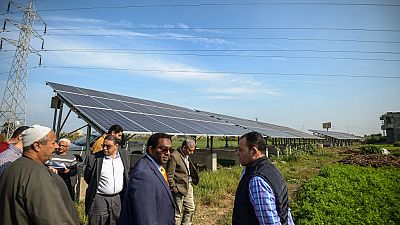Egypt
With year-round sunshine, North Africa has enormous potential for solar power, but the huge investments and public support needed for large projects are a challenge for cash-strapped regional governments.
While they boast some of the world's largest PV projects, countries in the region would do better to focus on smaller projects with more tangible results, say solar entrepreneurs.
Egypt, the most populous Arab country with some 102 million inhabitants, has set itself the goal of achieving 42% of its electricity from renewable energy sources by 2035.
The Benban solar park is the perfect embodiment of this new Egyptian ambition. Located in a desert area so vast that it can be seen from space, this colossal installation -- six million solar panels over 37 square kilometers -- is the result of a $4 billion (€3.4 billion) project partially funded by the World Bank.
However, the output of this solar park inaugurated in 2019 can light only 420,000 Egyptian homes, according to the United Nations. And in 2016, only 9% of the country's electricity came from renewable energy, according to the most recent official figures.
- Incentives -
So if the authorities hope to pick up the pace, they will need to put in place incentives for consumers who often lack the material means to switch to solar power, says green economy researcher Mohamed Abdel Raouf.
If he considers rural Egypt and tourist complexes of the Mediterranean and Red Sea coasts suitable for the expansion of photovoltaic, the researcher assures that installing solar panels in Cairo may prove tricky "because it takes a lot of space" at the top of buildings in particular, a real challenge for a city as densely populated as the Egyptian capital housing about one fifth of the Egyptian population.
Moreover, the solar panels would not manage to cover certain energy-consuming needs of the megalopolis as "the supply of the air-conditioners during the summer", specifies the specialist of the Middle East.
For each Cairo household, Raouf estimates the cost of switching to solar energy at about 60,000 Egyptian pounds (3,350 euros). "Why would we invest in an environmentally friendly technology that is expensive?" he questions.
"The state must take the initiative to make (this operation) attractive," he says.
In the last ten years, North Africa has increased its production of renewable energy by 40%, according to data from the International Energy Agency (IEA), but dependence on fossil fuels remains strong.
Algeria is a large oil and gas country and enjoys 3,600 hours of sunshine annually. However, renewable energies represent only 1.8% of the country's energy consumption.
- "Monstrous projects" -
Among the pioneers of green energy in the region, Morocco boasts its Noor Ouarzazate power plant, one of the largest solar complexes in the world, at the gateway to the Sahara, in the south of the country. But it is being run at a loss.
"From the beginning, it was clear that the strategy was unbalanced. The error (...) is to have wanted to invest in monstrous projects that are difficult to finance," said to AFP the expert in energy control Said Guemra.
For Ahmed Zahran, CEO of the Egyptian start-up Karm Solar, it is time to change the business model of selling energy to the state, based as in Benban on public-private partnerships.
"The companies are focused on selling electricity to their buyer (editor's note: the state)" and are not really interested in "contributing to the infrastructure of the countries in which they operate," he says.
The first private company to obtain a license to distribute solar electricity in Egypt, Karm Solar designs solar-powered buildings and water pumping systems to allow villages to have access to water and electricity without the need to use the national grid or fossil fuels.
On its website, Karm Solar boasts that it has avoided the consumption of 2.3 million liters of diesel and the production of 10,000 tons of carbon dioxide per year, among other things.














00:53
Algeria expels over 1,800 migrants to Niger in mass deportation
01:42
Cairo service honours Pope Francis' legacy
Go to video
Exhibition in Morocco explores a world of color
Go to video
Tunisia: new Human Rights Watch report finds dramatic increase in politically motivated arrests
Go to video
The EU moves to fast-track asylum claims by migrants from 7 countries to speed deportation
Go to video
Drones, AI cars and delivery robots: Gitex Africa tech show closes its third edition